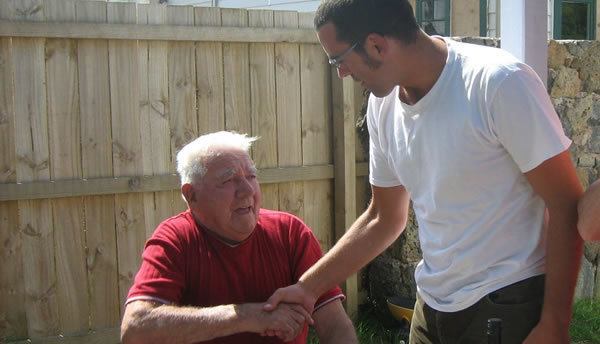My Poppa was a fighter. At 67 he took me (a 1st XV rugby player) out to round up sheep. After chuckling at me getting bounced off countless times, he caught a sheep with one hand.
Twenty years later Poppa met his match – brain cancer. In the end he couldn’t tolerate it any longer, and so he refused any further assistance. He won the fight against cancer by denying himself food or water. Thanks to the opponents of assisted dying, this was the only way he could exercise some choice over how he died.
We live in a free society, where generally people have the right to choose to do whatever they want. In order to remove that freedom, the government needs a good reason. The opponents of assisted dying have offered several arguments to back up their case, but none of them are logical and evidence based. All that remains is their belief in the sanctity of life, or an arrogant belief that experiencing a natural death is good for the patient and their family. These are spiritual beliefs held by a few people, and are not good reasons to rob people like Lecretia Seales of the right to choose how they die.
This is a sensitive topic so lets be very clear what we are talking about here. Assisted dying means that, if you are terminally ill and following appropriate checks and balances, you can administer yourself a lethal dose provided to you by a doctor.
If you wouldn’t make this choice yourself, then don’t choose it. That is no reason to prevent other people having the choice. I don’t drink coffee, I can’t stand the taste but I don’t want to ban it to stop other people making that choice.
Most Kiwis seem to see this logic – they want the choice over how they die even if they probably wouldn’t use it themselves. Opponents argue that doctors are divided on the issue, but no one has asked the doctors specialising in dealing with death. Most doctors wouldn’t want to give you a hip replacement either – they don’t have the training for it – that is why we have specialists.
Another argument put forward is that if we got our palliative care or mental health services right then people wouldn’t want an assisted death. While palliative care and mental health could well do with more funding, there is no evidence that with extra cash either service can eliminate the desire for an assisted death.
That might be because a terminally ill patient wanting to end their suffering isn’t a sign of an illness that needs treating. It comes down to individual values and how we each define a ‘dignified death’. Shouldn’t we cater to the needs of the dying in the a way that aligns with their personal values rather than some out-dated moral code?
As a last ditch attempt to make a sensible argument, opponents of assisted dying slip into scaremongering. People will be bullied into it, they claim. Mistakes are made about whether illnesses are truly terminal, they tell us. It is a slippery slope, they squeal. There is no evidence of any of these things happening overseas where assisted dying is legal.
It is legal for terminally ill, competent adults to seek a physician-assisted death in the US states of Oregon, Montana, Washington, Vermont, and California. In the US the numbers of assisted deaths are very small; in 2013, about 300 terminally ill Americans were prescribed lethal medications, and 230 died from taking them. There are wider, more encompassing laws (including assisted suicide and euthanasia) in the Netherlands, Belgium, Germany and Switzerland.
The numbers using assisted dying in New Zealand are likely to be small, but having that choice is invaluable for people facing the reality of a wretched death and their families. I don’t know if it is the end my Poppa wanted, but it bugs me that he didn’t even have the choice.
As Helen Kelly has pointed out, we need a much bigger conversation about how we treat death in our society. Currently our attitude towards death is to throw ever increasing amounts of futile treatment at the problem, rather than ensuring the inevitable happens with dignity. Legalising assisted dying is part of a much larger conversation, but it is the easy bit. It is a no brainer.
Go on, make a submission.
The latest select committee to “investigate fully public attitudes towards the introduction of legislation which would permit medically-assisted dying in the event of a terminal illness or an irreversible condition which makes life unbearable” is soon to start discussions with public submissions on the bill closing on February 1st.
The Select Committee will investigate: 1. The factors that contribute to the desire to end one’s life. 2. The effectiveness of services and support available to those who desire to end their own lives. 3. The attitudes of New Zealanders towards the ending of one’s life and the current legal situation. 4. International experiences.
We encourage you to make a submission to the select committee, which you can doonline , by email, or by post. Alternatively, you can complete this form and it will be submitted on your behalf via email.
Please note submissions are public.
[gravityform id=”7″ title=”false” description=”false”]
